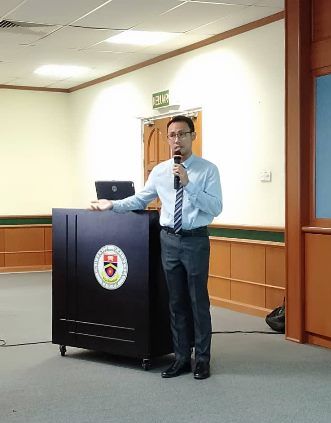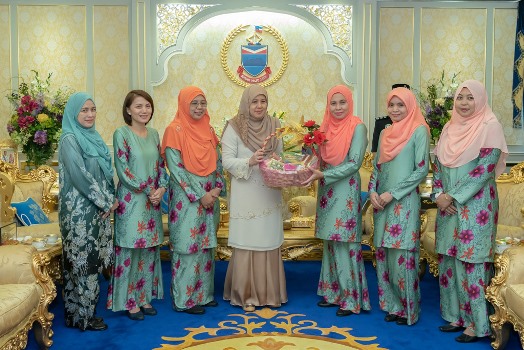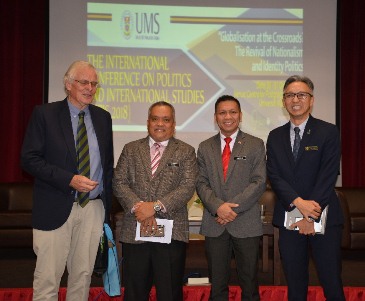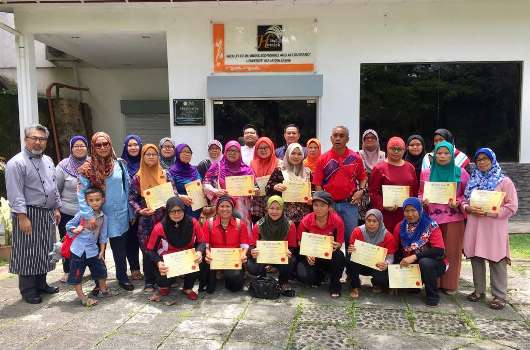 THURSDAY, 22 NOVEMBER The Research Unit for Languages & Linguistics of Sabah (RULLS), PPIB successfully held its fourth Brown Bag Seminar Series for Languages & Linguistics on 24 September 2018 at Bilik Mesyuarat Utama, PPIB with the title ‘Keeping the Heritage, Embracing the Global: Some Considerations for English Language Instructors’ delivered by Dr. Daron Benjamin Loo from the Centre for English Language Communication, National University of Singapore.
THURSDAY, 22 NOVEMBER The Research Unit for Languages & Linguistics of Sabah (RULLS), PPIB successfully held its fourth Brown Bag Seminar Series for Languages & Linguistics on 24 September 2018 at Bilik Mesyuarat Utama, PPIB with the title ‘Keeping the Heritage, Embracing the Global: Some Considerations for English Language Instructors’ delivered by Dr. Daron Benjamin Loo from the Centre for English Language Communication, National University of Singapore.
Dr. Daron Benjamin Loo received his PhD in Applied Linguistics from the School of Liberal Arts, King Mongkut’s University of Technology Thonburi, Thailand. While his main research interests lie in the examination of professional identities of language educators, he is also interested in the sociology of English learners in the international context.
Some of his recent research projects include examining narratives of disruption among English teachers in Kota Belud, Sabah, and the shifts in professional identity among language educators in light of educational policy changes in Thailand.
Dr. Daron in his talk discussed issues “regarding the possibilities of developing and maintaining a heritage language, whilst being engaged as an English language professional.”
This is especially in the context of Sabah which is rich in local indigenous languages that exist alongside English. In his abstract, Dr. Darron states that, “While global sentiments about heritage education have been positive, locally, it has been positioned on the fringe of other educational aspirations, such as to create cohesion through the nation’s official language.
Nonetheless, there seems to be a growing interest in issues concerning heritage education, especially in the teaching and learning of heritage languages. This may be due to the development of critical pedagogy and a reaction towards global mobility.
In English language education, studies have discussed the value of instilling pedagogical elements that support critical thinking, such as intercultural competence as a way to raise awareness about self and others.
On the other hand, international mobility afforded to English teachers has also compelled them to question the position of their heritage language in light of their profession as instructors of a global language.
These intersections between heritage education and global hegemonic communication practices inevitably place language education and instructors within uncharted terrains”.
Lecturers and language teachers from PPIB and FPP as well as TESL students were invited to the talk. Earlier, Assoc. Prof. Dr. Asmiaty Amat, Deputy Dean (Research & Community Service) of PPIB, gave a welcoming speech and at the end of the seminar presented a souvenir to Dr. Daron as a token of appreciation.
The Brown Bag Seminar Series features local and international speakers sharing and highlighting their research in the fields of languages and linguistics - two very rich sources of research data on Sabah's indigenous communities.
Individuals or organizations interested to give a talk at the Brown Bag Seminar session may contact Dr. Jeannet Stephen (This email address is being protected from spambots. You need JavaScript enabled to view it.), Head, Research Unit for Languages & Linguistics of Sabah. js/bbssll-4-2018



 THURSDAY, 15 NOVEMBER - The Centre for Industry and Community Network (CICN), Universiti Malaysia Sabah (UMS) recently hosted the UMS Academia Industry Community Award 2018 (AICA 2018) in Kota Kinabalu.
THURSDAY, 15 NOVEMBER - The Centre for Industry and Community Network (CICN), Universiti Malaysia Sabah (UMS) recently hosted the UMS Academia Industry Community Award 2018 (AICA 2018) in Kota Kinabalu. FRIDAY, 02 NOVEMBER – The Housewives and Women Staff Club of Universiti Malaysia Sabah (KESUMBA) paid a courtesy visit to the consort of the Head of State, Toh Puan Datuk Seri Panglima (Dr.) Hajah Norlidah Tan Sri Datuk R.M. Jasni who is the Patron of the club, at the Istana Negeri recently.
FRIDAY, 02 NOVEMBER – The Housewives and Women Staff Club of Universiti Malaysia Sabah (KESUMBA) paid a courtesy visit to the consort of the Head of State, Toh Puan Datuk Seri Panglima (Dr.) Hajah Norlidah Tan Sri Datuk R.M. Jasni who is the Patron of the club, at the Istana Negeri recently. WEDNESDAY, 31 OCTOBER – The Centre for the Promotion of Knowledge and Language (PPIB) in collaboration with the International Relations Programme of the Faculty of Humanities, Arts and Heritage (FKSW) held an International Conference on Politics and International Studies (ICPIS) 2018 at the Centre for Postgraduate Studies Auditorium, Universiti Malaysia Sabah (UMS).
WEDNESDAY, 31 OCTOBER – The Centre for the Promotion of Knowledge and Language (PPIB) in collaboration with the International Relations Programme of the Faculty of Humanities, Arts and Heritage (FKSW) held an International Conference on Politics and International Studies (ICPIS) 2018 at the Centre for Postgraduate Studies Auditorium, Universiti Malaysia Sabah (UMS). TUESDAY - As the Kampung Kobuni on a fast track to become the next tourism destination in Sabah, 21 villagers and homestay operators took part in a workshop on food preparation and handling at Hotelab, Universiti Malaysia Sabah (UMS) recently.
TUESDAY - As the Kampung Kobuni on a fast track to become the next tourism destination in Sabah, 21 villagers and homestay operators took part in a workshop on food preparation and handling at Hotelab, Universiti Malaysia Sabah (UMS) recently.